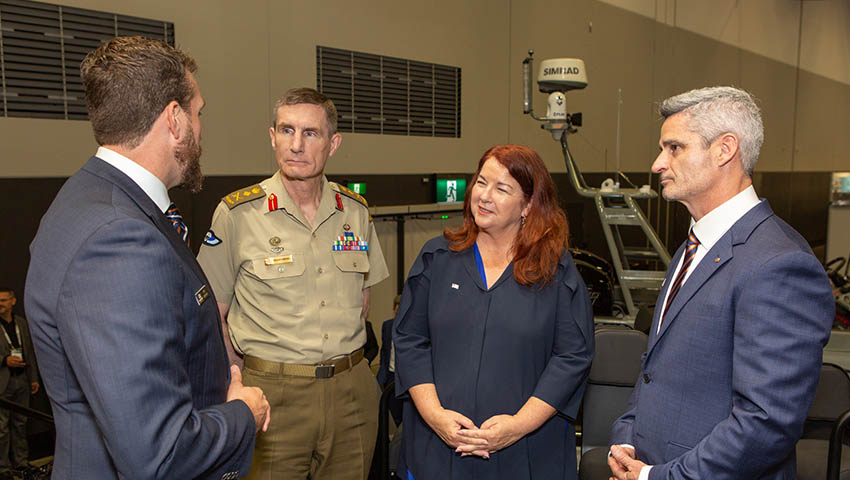Defence Industry Minister Melissa Price has announced that Australian defence industry businesses seeking to participate in the government’s $270 billion capability investment will benefit from updated Commonwealth procurement guidelines.
As the Commonwealth government continues to navigate through the economic turmoil resulting from the COVID-19 pandemic, it has shifted gear to enhance the opportunities available to Australian business, particularly defence industry seeking to support the government's $270 billion defence capability investment.
Like all Commonwealth procurement, defence procurement is guided by the Department of Finance’s Commonwealth Procurement Rules (CPRs), which includes more stringent requirements for procurements valued above $4 million for non-construction services and $7.5 million for construction services.
In order to support domestic economic growth and support Australia's burgeoning defence industrial base, the Commonwealth update to the CPR guidelines includes a number of policy additions designed to foster stronger ties between industry and the government.
Defence Industry Minister Melissa Price explained the government's objectives and rationale with the updated CPR guidelines, telling Defence Connect, "These are important changes aimed at forging new opportunities for Australia’s terrific defence industries.
"With the impacts of COVID-19, it’s critical we continue to explore ways to support local businesses. That’s why I am working on a new and enhanced AIC contractual framework and an Independent AIC Audit Program."
A central focus of the changes is government's discretion when considering the 'value for money' proposition, with a specific focus on the broader economic impact procuring Australian content would have on the local economy.
The updated guidelines explain this in greater detail, stating, "The government recognises the importance of considering the economic benefit of procurements to the Australian economy. Commonwealth entities have flexibility in the way in which they assess value for money, including the economic benefit to Australia, depending on their business need and the nature and scope of the procurement.
"This assessment will require officials to gather appropriate information on economic benefits as part of the decision making process and document how economic benefit has been considered as part of the overall value for money assessment."
Expanding on these two points, with defence industry specifically in its sights, the updated guidelines spell out specific measures for nurturing the growth of Australia's sovereign defence industrial capabilities, stating:
"[The domestic economic benefit] provides broader benefits that support the development and sustainment of industry capabilities; for example, enhancing key industry sectors through the Department of Defence’s Sovereign Industrial Capability Priorities." This is also expanded to focus on supporting an increased transfer of intellectual property, with the update adding: "transfer of technology to Australian businesses such as through licensing arrangements for intellectual property".
This means that when considering 'value for money', Defence must give consideration to the contribution of small business, AIC, sovereign capability and building skills.
Minister Price added, "The new procurement guidance will also strengthen the case to back local businesses."
Australian defence SMEs will receive a major boost from the updated CPR guidelines, with government placing specific focus upon levelling the playing field for SMEs. To this end, the updated guidelines state:
"Procuring officials should be careful to ensure that the requirement to demonstrate economic benefit does not inadvertently disadvantage SMEs. For example, officials should be mindful that additional requirements in tender documentation could result in a greater burden on SMEs than larger businesses. This could be due to the SME possessing fewer resources to demonstrate their capability to meet the requirements, compared to established large suppliers to the government. All potential suppliers must be treated equitably and must not be discriminated against on the basis of their size, location or ownership."
Expanding on this, the guidelines add more targeted advice for the consideration of Australian defence SMEs when tendering for programs: "Officials should make clear in tender documentation that only direct effects, or first-round economic effects to the Australian economy are considered in the evaluation of a tender’s economic benefit. This will help to provide clarity around the requirement and reduce the likelihood of tenderers including claimed benefits that will not be considered. Where feasible, quantitative and qualitative economic benefits considered in tender submissions should be verified at the appropriate stage of the procurement."
Minister Price said, "I welcome the fact that tender evaluators within Defence have been given clear guidance to consider the benefit Defence opportunities bring to Australian jobs and small businesses."
It is important to recognise that Australian SMEs will be expected to show how they will deliver a domestic economic benefit, with some metrics highlighted, including:
- Providing skills and training that benefit Australian communities;
- Employing workers in Australia;
- Employing apprentices or trainees in Australia;
- Reducing environmental impact through energy-efficient inputs;
- Using recycled materials or content;
- Developing and adopting innovative products or practices that benefit Australian communities;
- Creating export opportunities for Australian goods and services; and
- Developing Australian industry capabilities or industrial capacity.
Minister Price explained to Defence Connect, "This gives Australian small business full, fair and reasonable opportunity to be front and centre when Defence makes procurement decisions."
The Commonwealth government has updated the guidance around these provisions to strengthen the expectations of procurement decision-makers, so they give the best possible opportunity to Australian industry. The expanded guidance includes more specific details about what factors to consider when awarding a Defence contract.
The full updates to the Commonwealth Procurement Rules are available here.


